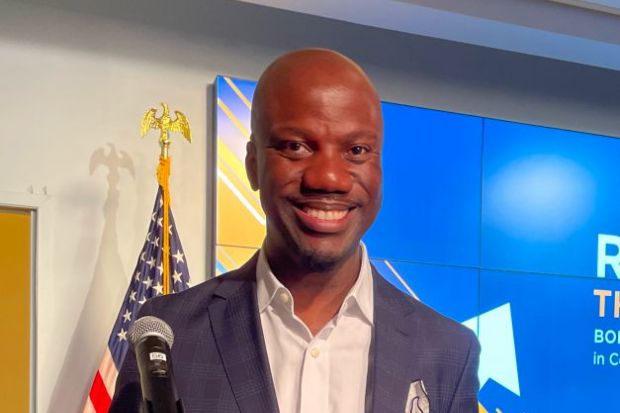The Biden administration has chided US higher education for doing far too little to back its oft-stated commitment to racial equity, complaining that institutions have taken substantial Covid-related aid while showing little progress in minority success rates.
Led by the US secretary of education, Miguel Cardona, federal officials hosted a day-long gathering for college leaders to share their strategies for boosting outcomes for students from disadvantaged communities.
The success stories they celebrated include Sacramento State University, Morgan State University and Valencia College – which have used tools that include grant aid, mentoring and peer tutoring to help students get and stay on track. They’re contributors to what the US undersecretary of education, James Kvaal, called a little-appreciated 8 per cent increase in the US college graduation rate over the past decade.
But across the wider US higher education landscape, Dr Cardona told the event in Washington, achievements in equity remain badly uneven, even after two years of pandemic-driven federal aid – more than $76 billion (£63 billion) routed through colleges and universities – that was intended to help the nation’s most vulnerable students.
THE Campus resource: Questions you should ask yourself about your role in institutional racism
Despite that massive investment, the secretary said, 60 per cent of black US undergraduates and nearly half of Latino students are still failing to graduate – compared to just 36 per cent of white students and 26 per cent of ethnic Asians. Total postsecondary enrolment fell by about 685,000 students, or nearly 5 per cent, in spring 2022, compared to a year earlier. Three-fifths of US college students say they are somewhat or very concerned about the cost, according to new data from the survey company College Pulse and the tuition insurance provider GradGuard.
Directing his comments to the nation’s college presidents and other education leaders, the secretary declared: “If you’re not using this moment in our country’s history of disruption, to build it back different and better for our students, should you be in that role?”
He added: “Yes it’s going to be hard, it should be hard; if it gets too easy, maybe you’re not pushing hard enough.”
The event, hosted by the Department of Education, was called the “Raise the BAR Summit.” It brought together dozens of equity advocates in higher education – largely from lower-resourced institutions serving lower-income students – to compare and learn from their experiences.
Speaking with clear frustration, Dr Cardona, Mr Kvaal and other department leaders repeatedly said the situation won’t get better if colleges and universities keep taking the government money but don’t fully embrace what it is meant to accomplish.
“In case I have not been clear yet, allow me to restate it,” the secretary said. “We need a culture change in higher education – now!”
The conference arose in part from the urging of Shaun Harper, a professor of business and education at the University of Southern California who also serves as executive director of the USC Race and Equity Center. Professor Harper has led a multiyear project that uses in-depth surveys to show how deeply student success is affected by the racial climate of their campus.
To demonstrate the gaps in institutional effort cited by Dr Cardona, Professor Harper told the conference that while universities now hire both chief diversity officers and chief financial officers, they wouldn’t keep a CFO who consistently fails to develop and implement an effective financial plan. “If it happens repeatedly, that CFO is going to be fired,” he said. “There’s no such analogous accountability and strategy” for universities and their commitment to equity, he said.
So far, Professor Harper said in an interview afterward, the added government money doesn’t seem to be changing much. “I can very confidently predict,” he told Times Higher Education, “that the outcome here is going to be that many states and institutions within those states are going to waste this money, and not use those funds to repair historical inequities and to accelerate equity.”
Register to continue
Why register?
- Registration is free and only takes a moment
- Once registered, you can read 3 articles a month
- Sign up for our newsletter
Subscribe
Or subscribe for unlimited access to:
- Unlimited access to news, views, insights & reviews
- Digital editions
- Digital access to THE’s university and college rankings analysis
Already registered or a current subscriber? Login







